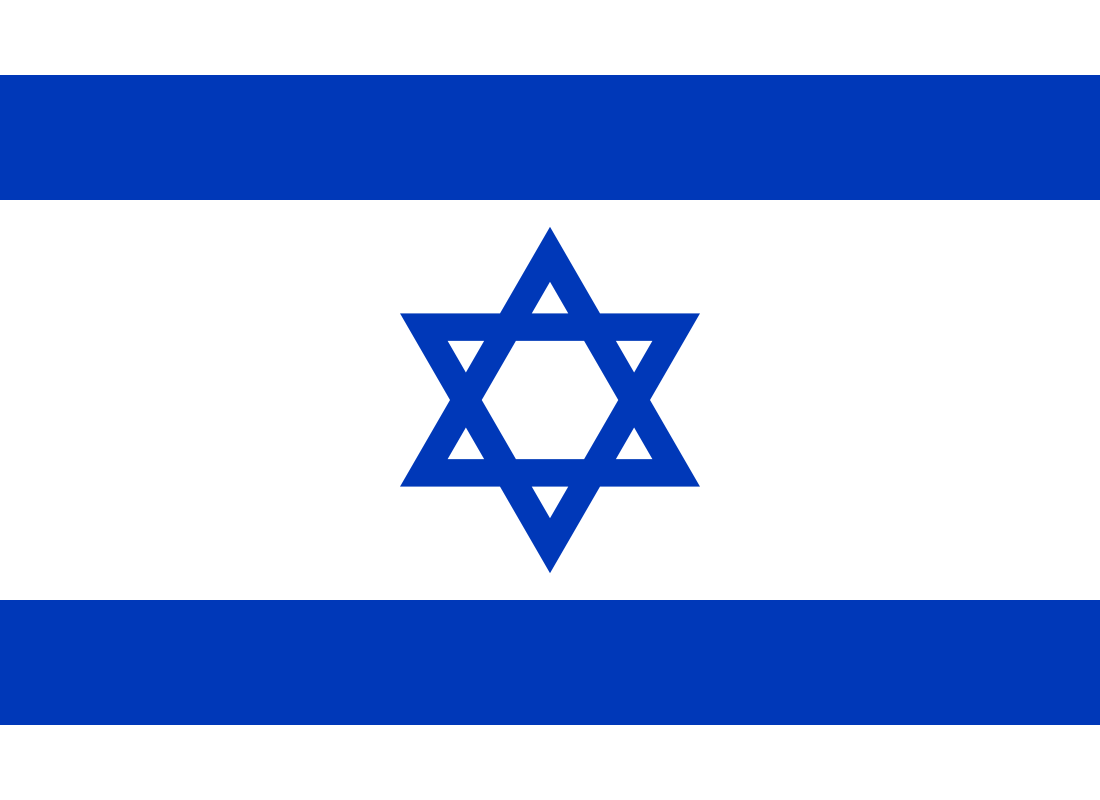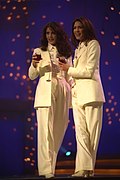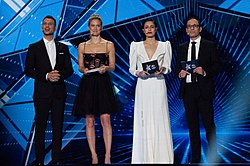Top Qs
Timeline
Chat
Perspective
Israel in the Eurovision Song Contest
From Wikipedia, the free encyclopedia
Remove ads
Israel has been represented in the Eurovision Song Contest 47 times since its debut in 1973. The current Israeli participating broadcaster in the contest is the Israeli Public Broadcasting Corporation (IPBC/Kan). Israel has won the contest four times, and has hosted it in Jerusalem in 1979 and 1999, and in Tel Aviv in 2019.
Israel's first appearance in the contest in 1973 was successful, with "Ey Sham" performed by Ilanit finishing fourth. Israel then achieved victories in 1978 and 1979, with "A-Ba-Ni-Bi" by Izhar Cohen and the Alphabeta, and "Hallelujah" by Milk and Honey. In 1980, the Israeli broadcaster declined to host the contest for a second consecutive year due to financial reasons. Because the contest date in the Hague conflicted with Yom HaZikaron, Israel did not participate. This remains the only instance of a winning country not competing the following year. The country's best results in the 1980s were second-place finishes for "Hora" by Avi Toledano in 1982 and "Hi" by Ofra Haza in 1983. Israel achieved its third victory in 1998, with "Diva" by Dana International. To date, Israel holds the record for the most participations and the most wins in the contest without finishing last, but it has placed second-to-last in the final thrice—1986, 1993, and 2006—and received nul points from the juries in 2019.
Since the introduction of the semi-finals in 2004, Israel has failed to reach the final seven times. In 2005, "HaSheket SheNish'ar" by Shiri Maimon gave the country its tenth top-five result, finishing fourth. After failing to qualify for the final for four consecutive years (2011–14), Israel reached the final in 2015 with "Golden Boy" by Nadav Guedj finishing ninth, and the country has participated in the final every year since with the exception of 2022, while also recording a fourth win in 2018 with "Toy" by Netta.
Israel's participation has been subject to numerous controversies mostly due to the Israeli–Palestinian conflict and the wider Arab–Israeli conflict, and since the Gaza war which began in October 2023, these tensions have spilled over into the contest.
Remove ads
History
Summarize
Perspective
The Israel Broadcasting Authority (IBA) was a member of the European Broadcasting Union (EBU), making it eligible to participate in the Eurovision Song Contest. It had participated in the contest, representing Israel, since the 18th edition in 1973. In 2017, the IBA was succeeded by the Israeli Public Broadcasting Corporation (IPBC/Kan), which has been responsible for Israel's participation in the contest since the following year.
To date, there have been four Israeli victories in the contest. Izhar Cohen and the Alphabeta won in Paris in 1978 with "A-Ba-Ni-Bi". On home ground in Jerusalem the following year, Israel won again, this time with "Hallelujah" performed by Milk and Honey. Unusually, Israel did not defend the title in 1980[1] (see below). The third victory came almost 20 years later in Birmingham in 1998, when Dana International took top honours with the song "Diva". It took a 20-year wait for Israel to record its fourth victory at the 2018 contest in Lisbon, with the song "Toy" by Netta, earning Israel its highest-ever score of 529 points.
Israel's earliest selections were picked by the IBA. The first singer to represent the country was Ilanit, who finished 4th in 1973. In 1972, while Ilanit was in Germany recording as part of the duo Ilan and Ilanit with her partner Shlomo Tzach, the duo received an offer to represent Germany in that year's contest. Since Israel was eligible to participate, they approached the IBA with a proposal that Ilanit would represent Israel. However, the registration period was over by then and Ilanit was told she could represent Israel in 1973.[2][3] After she was sent again four years later, it was decided that henceforth the winner of the Hebrew Song Festival would represent Israel. The 1978 and 1979 Israeli Eurovision winners were selected by this method. From 1981, the selection process took place via the Kdam Eurovision with the exception of 1990, 1998, 1999, 2000 and 2002, when the IBA selected its representatives internally.
After winning the contest in 1978 and 1979, the IBA was financially and logistically unable to organise the event for a second consecutive year. The Netherlands agreed to host the 1980 contest in Israel's place. The date chosen for that year's contest coincided with Yom HaZikaron, Israeli Memorial Day, so Israel could not compete. This made Israel the only country to date unable to defend its title. The 1980 winning song "Pizmon Chozer" by The Brothers & the Sisters never had an opportunity to compete.
In 1984, Israel again refrained from participating due to the same date conflict. It was rumoured that Ilanit and the song "Balalaika" would have been its representative that year, but this was denied by Shlomo Zach, the producer of the song.[4][better source needed]
Israel's entries have had a mixed reception. Avi Toledano (1982) and Ofra Haza (1983) scored well with big revivalist numbers, but the all-singing, all-dancing style became less popular later in the decade and Israel's 1986 entry, "Yavo Yom" by Moti Giladi and Sarai Tzuriel, came in 19th.
In 1987, Israel finished 8th with "Shir Habatlanim" by the satiric duo Lazy Bums. Then-Israeli Minister of Culture, Yitzhak Navon, said he would resign if the song went on to represent Israel at the contest; this ultimately did not occur.
In 1990, Rita's "Shara Barkhovot" was not well received, but in 1991, Orna and Moshe Datz finished third, Israel's best result since 1983. Israel also had a 5th-place finish by Eden when it hosted the 1999 contest. Ping-Pong's disco effort in 2000 failed, though the group was noted for their optimistic lyrics and message of reconciliation and peace. They waved Syrian flags at the end of their performance, angering some Israelis.
In 2004, David D'Or came 11th in the semi-final with "Leha'amin", leaving Israel out of the final for the first time since 1997. Shiri Maimon with "HaSheket SheNish'ar" in 2005 brought Israel back to the top five, and ensured Israel a place in the 2006 final, where it was represented by singer Eddie Butler, who had finished 5th as part of Eden in 1999; however, his performance of the song "Together We Are One" finished 23rd, with only four points.
IBA's Eurovision committee chose Teapacks to represent Israel in 2007. Their humorous entry "Push the Button" finished 24th out of 28 in the semi-final and did not advance to the final. As a result, Israel had to compete in the 2008 semi-final, from which it advanzed to the final, where Boaz and "The Fire in Your Eyes" finished ninth. In 2009, for the first time, an Arab citizen of Israel represented the country: Mira Awad performed "There Must Be Another Way" alongside Jewish-Israeli singer Noa in Moscow. Israel was represented in 2010 by Harel Skaat, who came 14th in the final with "Milim".
Israel's participations from 2011 to 2014 were less successful, as former Eurovision winner Dana International in Düsseldorf, the band Izabo in Baku, Moran Mazor in Malmö, and Mei Finegold in Copenhagen all failed to qualify for the final. The 2014 non-qualification led to Kdam Eurovision being discontinued, and the IBA later partnered with Keshet to use the existing reality singing competition HaKokhav HaBa to select the Israeli artist—a method that has mostly continued since—though the song selection has gone through various formats. In 2015, Nadav Guedj brought Israel back to the final with "Golden Boy", the first Israeli entry without a Hebrew lyric. Before Netta's win, Israel also managed to qualify in 2016 with Hovi Star and "Made of Stars", which finished 14th, and in 2017 with Imri Ziv and "I Feel Alive", which finished 23rd. In 2019, as hosts with Kobi Marimi and his song "Home", Israel was pre-qualified for the final and finished 23rd, making it the fourth time since 2015 that the host country ranked in the bottom five.
In 2020, Eden Alene was chosen to represent the country with "Feker Libi". After the 2020 contest was cancelled, she was retained as the Israeli representative for 2021, this time with "Set Me Free", which finished 17th in the final. The song features a B6 whistle note, the highest note in the contest's history. Michael Ben David, selected through The X Factor Israel, represented Israel in 2022 with "I.M," but failed to qualify for the final.[5] Internally-selected Noa Kirel finished third in 2023 with "Unicorn", Eden Golan placed fifth in 2024 with "Hurricane", and Yuval Raphael finished second in 2025 with "New Day Will Rise".
Remove ads
Participation overview
| 1 | First place |
| 2 | Second place |
| 3 | Third place |
| X | Entry selected but did not compete |
| † | Upcoming event |
Congratulations: 50 Years of the Eurovision Song Contest
Remove ads
Hosting
Awards
Marcel Bezençon Awards
Winner by OGAE members
Remove ads
Related involvement
Summarize
Perspective
Conductors
Heads of delegation
Commentators and spokespersons
Until 2018, Israel only had a television commentator once, in 1979. In most cases, the IBA opted instead to simply broadcast the transmission without commentary and with Hebrew subtitles. Between 2013 and 2017, it also aired the contest with Arabic subtitles on Channel 33. In both 1984 and 1997, which Israel also had to miss due to the holiday, the IBA aired the show on delay, and there was no radio broadcast. It also typically provided radio commentary beginning in the early 1980s, unless the country was not participating that year (with the exception of 2000). The IBA did not provide commentary until 2013, when it resumed radio broadcasting. In 2018, the IBA's successor, Kan, employed television commentators for the contest, which was a first for the country since 1979. The Israeli transmission was also shown internationally via the Israeli Network in 2003 and 2004.[24]
Remove ads
Costume designers
Remove ads
Photo gallery
- Chocolate, Menta, Mastik in The Hague (1976)
- David D'Or in Istanbul (2004)
- Harel Skaat in Oslo (2010)
- Dana International in Düsseldorf (2011)
- Moran Mazor in Malmö (2013)
- Mei Finegold in Copenhagen (2014)
- Nadav Guedj in Vienna (2015)
- Kobi Marimi in Tel Aviv (2019)
- Eden Alene in Rotterdam (2021)
- Michael Ben David in Turin (2022)
- Eden Golan in Malmö (2024)
- Yuval Raphael in Basel (2025)
Remove ads
Controversies
Summarize
Perspective
Israel's participation in the contest has resulted in several controversial moments in the past, with the country's first appearance in 1973, less than a year after the Munich massacre, resulting in an increased security presence at the venue in Luxembourg City.[60][61][62][63] Its first win in 1978 proved controversial for Arab states broadcasting the contest which would typically cut to advertisements when Israel performed due to a lack of recognition of the country, and when it became apparent Israel would win, many of these broadcasters cut the feed before the end of the voting.[64][65][66] Broadcasters from Arab states which are eligible to compete have largely not participated, with Morocco the only Arab state to have entered Eurovision, competing only once, in 1980 when Israel was absent.[67][68]
Israel's participation has been criticised by those who oppose current government policies in the state as well as on the Israeli–Palestinian conflict, with calls raised by various political groups for a boycott ahead of the 2019 contest in Tel Aviv, including proponents of the Boycott, Divestment and Sanctions movement in response to the country's policies towards Palestinians in the West Bank and Gaza, as well as groups who take issue with perceived pinkwashing in Israel.[69][70] Others campaigned against a boycott, asserting that any cultural boycott would be antithetical to advancing peace in the region.[71][72]
Following the outbreak of the Gaza war in October 2023, the Israeli–Palestinian conflict once again impacted the contest, with renewed calls for Israel's exclusion ahead of the 2024 event.[73] "Hurricane", Israel's entry for that year's contest, was accepted by the EBU,[74][75] although it was required to undergo rewrites as the EBU objected to the political nature of the original lyrics, which made reference to the 7 October attacks.[76][77][78] Israel's second-place finish and win in the public vote in 2025 was contested by several participating countries.[79][80][81][82] After Israel was permitted to compete in 2026, Iceland, Ireland, the Netherlands, Slovenia, and Spain announced they would not participate in protest.[83][84] Nemo, who won for Switzerland in 2024, returned their trophy in protest of Israel's continued inclusion.[85]
Remove ads
See also
Notes
- In order to reduce the number of participating countries at the 1996 event a qualifying round was held among all countries except the hosts. Israel failed to progress from this round; entries which failed to progress have subsequently been discounted by the EBU and do not feature as part of the countries' list of appearances.
- According to the then-Eurovision rules, the top ten non-Big Four countries from the previous year along with the Big Four automatically qualified for the Grand Final without having to compete in semi-finals. For example, if Germany and France placed inside the top ten, the 11th and 12th spots were advanced to next year's Grand Final along with all countries ranked in the top ten.
- The 2020 contest was cancelled due to the COVID-19 pandemic.
- Voted by commentators.
- All conductors are of Israeli nationality unless otherwise noted.
- Conducted by Izhak Graziani at the national final.
- Graziani also conducted the interval music.
- Went by "Silviu Nansi Brandes" at the contest.
Remove ads
References
Sources
Wikiwand - on
Seamless Wikipedia browsing. On steroids.
Remove ads
























